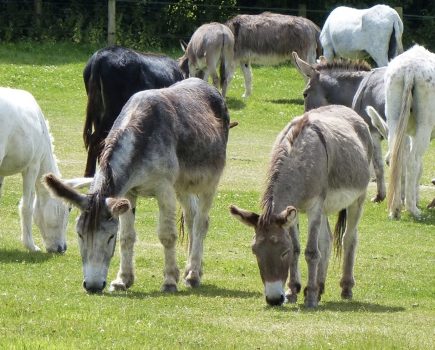Career smallholder Tim Tyne explains how halter training your cows can really pay dividends. Plus more of Tim’s smallholding tips…
If you keep cows on your holding then I’d strongly recommend that you halter train them, even if they spend most of their lives outdoors. It really isn’t difficult, as they’re by nature such gentle creatures. Most will take to it in a day or two, particularly if you offer an edible bribe! Even adult cattle that we’ve bought in, and which have had very little prior handling, have been successfully haltered. It makes routine procedures such as artificial insemination so much simpler if you’re able to put a halter on the required animal and lead her out of the field, with no need to gather the whole herd into a handling pen, and TB testing becomes a whole lot less stressful if the cows are used to being handled. What’s more, the closer rapport that you’ll develop with your cows as a result will enable you to maintain their health and welfare to a much higher standard, because you’ll be able to pick up on any subtle changes more easily.
And once trained they don’t forget; we recently brought one of our heifers down from the mountain, as she was close to calving. She’d been up there since May, with minimal human contact, yet I was still able to put a halter on her and lead her into the trailer!
Calling animals by name
One of the daftest bits of advice I hear regularly being offered to smallholders is: “Never give a name to any animal that’s destined for slaughter.” What nonsense! It doesn’t affect the flavour in the slightest! And besides, why should we deprive an animal of a name just because we’re going to eat it? If it’s your usual practice to give names to your beasts then go ahead and name them – even the ones that are heading for the deep freeze. They deserve the same degree of care and attention as any other animal on the holding.
And don’t worry about it upsetting the children either. It won’t. Children are generally delighted to know the name of what they’re eating, particularly if it was an animal that they played a part in the rearing of, such as a bottle-fed lamb.
Local knowledge
Make sure you spend plenty of time looking over the fences to see what your neighbouring farmers are up to. Their families have probably been making a living off the land in your area for several generations, and if they don’t know what works and what doesn’t by now, then probably nobody ever will! Observe what crops are grown, and where, and when activities such as cultivation, sowing and harvest take place. These are the sorts of things that vary considerably between regions, so can’t really be learned by studying what goes on elsewhere. Your neighbours will also know which breeds of livestock thrive best in the area, and under what management system. Take note of when they shear their sheep, when they turn their rams in, and how they manage their grassland to provide adequate grazing for the flock at different times of year. You may ultimately choose to do things very differently, but to disregard this kind of local knowledge out of hand would be foolish. At least by keeping an eye on what’s going on in the fields around you you’re able to make informed decisions.
Rams in winter
By December, tupping in most sheep flocks will be complete, and you can take the rams away from the ewes for a well earned rest. Although most of your attention will be directed towards the in-lamb ewes over the coming months, please don’t neglect the tups. A heavy fleece can easily conceal poor body condition, and on winter pasture rams may struggle to regain the weight they will have lost while they were working. If the weather takes a turn for the worse a run-down ram can go very poor very quickly, and reach a point of no return before you even realise what’s amiss. It’s worth offering a small amount of supplementary feed to the rams throughout the winter, just to keep them ticking over in good nick, even if the weather is relatively mild.
Fruit and veg
Make sure you regularly sort through stored fruit and vegetables, in order to pick out any that are beginning to deteriorate. If left unchecked, one rotten apple, onion or spud will soon contaminate its neighbours, and before you know it the whole batch will be ruined.
Anything that’s going a bit soft should be used up quickly in the kitchen, and spoiled individuals can be given to the pigs.
In our experience it’s not really worth trying to keep stored fruit or veg beyond Christmas, as the level of wastage is so high. It’s much more sensible to plan your cropping in such a way that you can harvest fresh vegetables all year round, and fruit is better off pulped and stored in the freezer, or made into jam, chutney and wine.
—————-
This article by Tim Tyne is from the December 2014 issue of Country Smallholding.
Image(s) provided by:
Archant







